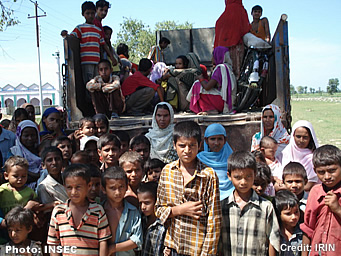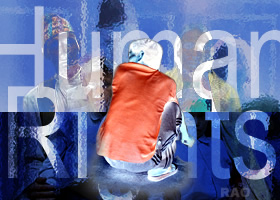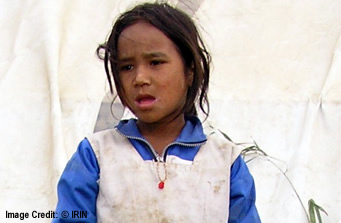Background The killing of local leader Moin Khan, President, Democratic Madhesi Mukti Morcha, on 16 September triggered violence between different groups in Kapilvastu, which spread to Dang on 20 September. Indefinite curfews were imposed by the district administration in Kapilvastu and Dang to curb the violence. Figures on the death toll in Kapilvastu range between 21 and 31 killed, with around 25 reported injured. The Ministry of Home Affairs has recorded the destruction of 325 houses and shops in six village development committees, along with 155 vehicles torched and vandalized by mobs since 16 September. The Ministry also reports 20 houses being damaged in Dang district.
Overall
the security situation has improved; curfews have been lifted during the
daytime in both districts, but gatherings of more than five people are
still prohibited. Educational institutions in Kapilvastu were opened from
25 September 2007 - nine days after the riots started. Goodwill rallies
are being organized by various civil society groups in Dang.
At a meeting convened by the Home Secretary on 24 September the Ministry formally requested the UN system, ICRC and NRCS to mobilize and coordinate with local government officials in the provision of relief assistance in the two affected districts. The Ministry is also going to instruct the District Administration Offices in both districts to call for coordination meetings with relief agencies at the district level. Based upon the request by the Home Ministry, WFP has mobilized more than 80 metric tons of food aid for 5,000 IDPs in Kapilvastu and Dang. NRCS will conduct food distribution for WFP. To address shelter and non-food item (NFI) gaps, UNICEF is delivering 1,000 cooking sets, 1,000 hygiene kits, 1,000 bed nets, 1,000 blankets, 300 tarpaulin sheets (more in the process of being procured), 1,000 water guard bottles, 2,000 oral rehydration sachets, 1,000 buckets and mugs to the affected districts. UNICEF also has school kits available and can be provided if there is need. Over 3,000 individuals in Kapilvastu district and 600 individuals in Dang district have benefited from immediate relief support, including food and NFI, from ICRC/NRCS and UNICEF. NRCS has dispatched 1,000 tarpaulin sheets to Kapilvastu. The district administration office in Bhairahawa also sent 500 tents to Kapilvastu. Based upon a joint request from the Chief District Officer and NRCS district chapter of Kapilvastu, UNFPA is in the process of procuring NFI and medicines for IDPs in the district. UNFPA's mobile health team has already visited Chandrauta in Kapilvastu on 24 September, where they provided medical consultation to 60 IDPs, including reproductive health care for pregnant women IDPs. IRC's health team consisting of two doctors, two auxiliary health workers and medical supplies, is visiting the Lamahi camp in Dang today. The team will then move to IDP sites in Kapilvastu. The Home Ministry has also allocated NRs. 13 million (US$ 200,000) as emergency cash grant for victims of the riots and has reportedly started distributing cash grants to victims in Kapilvastu from 24 September. It is intending to provide NRs. 10,000 to displaced families whose houses have been completely destroyed and NRs. 5,000 for those whose houses have been partially destroyed. OCHA has established an on-site operations and information centre in Kapilvastu for agencies involved in the response, with local contact information, internet and printing facilities; currently situated in Bhairahawa. Copyright © UN Office for the Coordination of Humanitarian Affairs OCHA 2007 top
Shocked by the brutal killing of her father, seven-year old schoolgirl Nisha Sunwar can barely sleep or eat. "What had my father done? Why did they kill him?" asked the young girl. Her 40-year-old father Subaram was killed by a group of Madhesi people in Devipur village, Kapilvastu District, southeastern Nepal, after their local leader Mohit Khan was assassinated by unknown persons recently, said local villagers. Since 16 September violence between the Pahade and Madhesi ethnic communities has led to at least 18 deaths, and over 5,000 displaced people requiring humanitarian assistance, according to local human rights activists. Child
rights workers are concerned about the impact of the violence on children
- some of whom witnessed their parents being killed, have been displaced,
and are now traumatised, according to Child Workers in Nepal (CWIN), a
local non-governmental organisation (NGO).
"The local police and government authorities lack records of how many children have been killed and injured and this is a matter of serious concern," said Dhital. According to Kapilvastu's Lumbini hospital, over 40 children have received treatment for injuries. Senior police and government officials said they have instructed their colleagues at the local level to investigate. "I'm very scared to go back home. Who will help us?" asked 14-year-old Rita Pande. She lay on her bed, hungry, one of hundreds of displaced people living in tents at Chandrauta village. "My children need help. They need a proper place to stay and proper food. Please help us," said Rahimu Nisha, who has been displaced, like thousands of Madhesi civilians, in Bairani village, near the Indian border. A group of local child rights workers visited over 10 villages in Kapilvastu District and found the plight of children was very serious, and worse than that of the displaced adults. "The displaced children have been constantly on the move, with their parents clueless about where to go next. Many will not be able to return," said Dhital. All schools in Kapilvastu remain closed. Some have been burnt down and completely destroyed, according to child rights workers. Copyright © UN Office for the Coordination of Humanitarian Affairs 2007 [ This report does not necessarily reflect the views of the United Nations] Integrated Regional Information Networks (IRIN), part of the UN Office for the Coordination of Humanitarian Affairs (OCHA).
|








